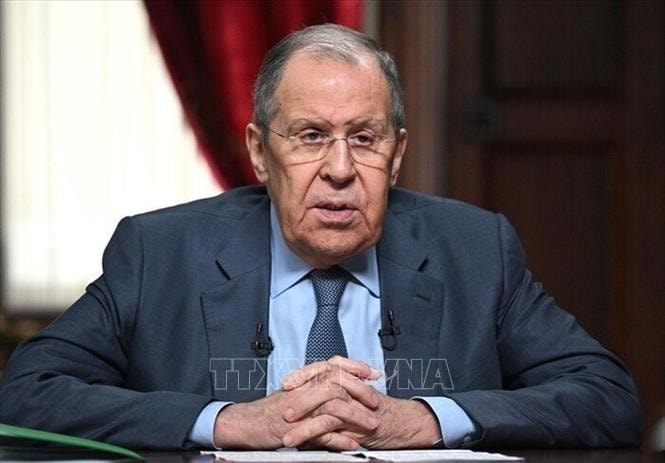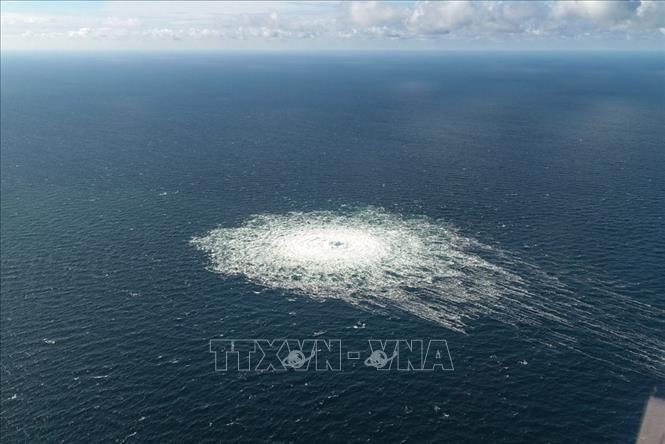Russian Foreign Minister Sergey Lavrov has revealed interesting information about Russia and the US discussing the Nord Stream pipeline.

TASS (Russia) on March 26 quoted Foreign Minister Sergey Lavrov in an interview on Channel One television that Moscow and Washington are currently negotiating the Nord Stream pipeline.
“Of course, there are differences,” the head of the Russian Foreign Ministry admitted. “But are the interests of Russia and the United States the only driving forces for restoring normal energy supplies to Europe? The Nord Stream pipeline is being discussed.”
Besides, Mr. Lavrov assessed: "It would be interesting if the Americans used their influence on Europe to ask the continent not to refuse Russian gas."
“Persons such as German Vice Chancellor Robert Habeck, European Commission President Ursula von der Leyen, German Defense Minister Boris Pistorius – they all said that they would never allow the Nord Stream pipeline to be restored,” the Russian foreign minister added.
On March 3, European Commission spokesperson for Climate Action and Energy Anna-Kaisa Itkonen emphasized that resuming the Nord Stream project with the participation of the US is not in the interests of the European Union (EU) because it does not help diversify the bloc's energy sources.
Meanwhile, the German Economy Ministry also affirmed that it is not negotiating with Moscow on Russian gas supplies through the Nord Stream 2 pipeline. The ministry's statement emphasized that independence from Russian gas is of strategic importance to Germany in terms of security policy and Berlin is persisting with this policy.
Nord Stream 2 was suspended after the Russia-Ukraine conflict broke out in early 2022. In September 2022, one of the two Nord Stream pipeline lines was damaged in explosions of unknown cause, leaving only one intact.
In the 90s of the last century, the Russian gas corporation Gazprom began research to build a gas export pipeline across the Baltic Sea to Central Europe without passing through Ukraine, Belarus, Poland and other Eastern European and Baltic countries.
In 2000, the European Commission approved the preliminary design of the Nord Stream pipeline. It was expected to be a pan-European network to ensure uninterrupted energy supplies to the Old Continent. The Nord Stream pipeline was built from 2010-2012, connecting the coast near Vyborg (Leningrad, Russia) to the city of Lubmin (Germany). From Germany, gas is transported to Denmark, the Netherlands, Belgium, France and many other countries.
Nord Stream's design capacity is 55 billion cubic meters of gas per year. In total, Nord Stream accounts for 32% of Gazprom's total export deliveries to countries outside the Commonwealth of Independent States (CIS).

In another development, on March 25, the US said it had separate agreements with Ukraine and Russia to ensure maritime safety in the Black Sea and not attack energy facilities in these two countries.
The White House statement said that in separate talks with the US in Saudi Arabia, Russia and Ukraine agreed to ensure maritime safety, eliminate the use of force and prevent the use of commercial vessels for military purposes in the Black Sea.
In addition, Washington will help restore access to world markets for Russian agricultural and fertilizer exports and will continue to facilitate negotiations on both sides to achieve lasting peace.
Meanwhile, Kremlin spokesman Dmitry Peskov said that delegations from Russia and the US had conducted technical consultations in Riyadh (Saudi Arabia) and sent reports to the leaders of each side. The results of the negotiations will not be announced.
On the same day, TASS news agency quoted Russian Foreign Minister Sergey Lavrov as saying that Russian President Vladimir Putin and his US counterpart Donald Trump had been informed of the results of the Russia-US consultations in the Saudi Arabian capital Riyadh. The focus of these discussions was ensuring maritime safety in the Black Sea.